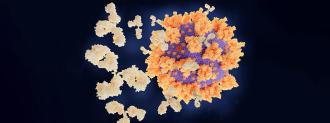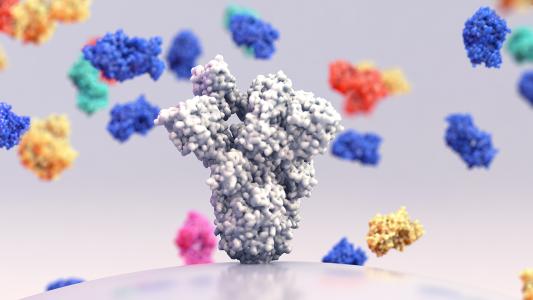A newly discovered antibody was able to neutralize not only all strains of COVID-19, but other coronaviruses known to cause respiratory infections in humans — a potential silver bullet for a whole class of deadly, flu-like viruses.
Mutant viruses: As viruses spread, they undergo tiny genetic mutations, and when we find a unique version of the virus, we call it a new strain.
Occasionally, new strains appear that can spread more easily, evade the immune system, or cause more severe disease.
Several worrisome strains of COVID-19 have already appeared during the pandemic — including the Delta variant and, more recently, C.1.2 — and we’re sure to encounter more before it’s over.
Antibody drugs: Mutations in the coronavirus’s “spike protein” are particularly troubling. This protein is found on the outside of the virus, and it attaches to “receptor” spots on our cells to break in and destroy them.
Antibodies can bind to the spike to prevent them from attaching to cells, and researchers can turn particularly effective antibodies (discovered in COVID-19 survivors) into drugs, called monoclonal antibodies, to treat people battling infections.
“[The antibody] appears to neutralize all … coronaviruses that cause respiratory infections in mammals.”
Jay Nix
The FDA has already authorized three such antibody drugs, but because the spike protein is mutating, the drugs that neutralize today’s strains of COVID-19 might not work on tomorrow’s.
The government has already pulled approval for one such drug, which no longer works against new variants when used by itself.
Targeting all strains of COVID-19: Now, an international research team has discovered a COVID-19 antibody with unprecedented neutralizing power.
“This antibody, which binds to a previously unknown site on the coronavirus spike protein, appears to neutralize all known sarbecoviruses — the genus of coronaviruses that cause respiratory infections in mammals,” researcher Jay Nix of UC Berkeley said in a press release.
“And, due to the unique binding site on [a] mutation-resistant part of the virus, it may well be more difficult for a new strain to escape,” he added.
Tests in hamsters suggest it might be able to prevent COVID-19 infections, too.
Looking ahead: So far, the ability of this antibody, dubbed S2H97, to neutralize all strains of COVID-19 has only been tested in the lab — more research is needed to find out how effective it might be at treating people.
Tests in hamsters suggest it might be able to prevent COVID-19 infections, but again, that still needs to be proved in humans.
If the antibody is able to live up to the hype, though, it could be a powerful weapon against all strains of COVID-19 — as well as other deadly coronaviruses like SARS and any future coronavirus pandemics.
We’d love to hear from you! If you have a comment about this article or if you have a tip for a future Freethink story, please email us at [email protected].






